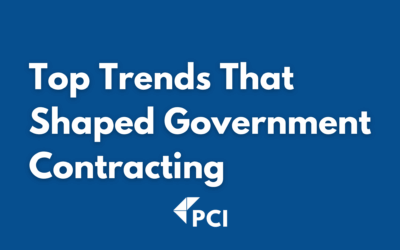The government contracting industry continues to evolve rapidly, and staying ahead of emerging trends is essential for contractors and small business owners. From economic factors like inflation to technological advancements in AI and cybersecurity, 2024 presented unique challenges and opportunities. Here is a look back at five trends that shaped the government contracting industry in 2024 and what contractors need to know to remain competitive.
1. Inflation and Interest Rates
Inflation and rising interest rates created a ripple effect across the government contracting landscape. Contractors are facing increased costs for labor, materials, and services, which impacts project bidding and profit margins. Fixed-price contracts, in particular, pose a significant risk as contractors must account for inflation while remaining cost-competitive.
How to Navigate This Challenge:
- Reassess Cost Models: Work with financial experts to adjust pricing models and account for inflation.
- Forecast with Precision: Use economic data to anticipate long-term financial impacts.
Understanding the economic landscape is critical in this environment. Proactive planning will help government contractors weather financial pressures and protect their bottom lines.
2. AI & Cybersecurity
Artificial intelligence (AI) and cybersecurity reshaped how contractors operated in 2024. AI-powered tools can enhance operational efficiency by automating data analysis, streamlining compliance processes, and improving decision-making. At the same time, cybersecurity threats are escalating, with contractors increasingly targeted due to their access to sensitive government data.
Leveraging Technology in 2025:
- AI in Recruitment: AI enables faster talent acquisition by analyzing resumes and assessing qualifications.
- Proactive Threat Mitigation: Contractors must evolve from reactive models to predictive cybersecurity to stay ahead.
To stay competitive, contractors should invest in AI technology while ensuring robust cybersecurity measures are in place. Compliance requirements like CMMC will demand additional preparation to bid on federal contracts successfully.
3. Small Business Prioritization
The federal government remains committed to supporting small businesses within the contracting ecosystem. Agencies continue to set aside contracts specifically for small, minority-owned, and veteran-owned businesses. However, competition within these categories is intensifying as more small businesses enter the market.
Tips for Small Businesses:
- Leverage Certifications: Obtain certifications like 8(a) or HUBZone to qualify for set-aside contracts.
- Network Strategically: Build relationships with government agencies and established contractors.
- Focus on Niche Opportunities: Specializing in a niche area can reduce competition and position your organization as an expert.
Government goals to increase small business participation are creating opportunities and challenges. Staying informed and building key relationships will help contractors succeed.
4. Labor Market Challenges
The labor market remained tight in 2024, with highly skilled talent in short supply. Government contractors struggled to fill positions requiring specific expertise, such as IT professionals and compliance experts. These positions are critical to executing contracts effectively, and the shortage adds to overall project costs and delays.
How to Address Hiring in 2025:
- Upskilling Current Employees: Invest in training programs to broaden the skillsets of your existing workforce.
- Flexible Work Options: Allow remote or hybrid work arrangements where possible to expand the talent pool.
Smart hiring strategies are essential to overcoming these workforce-related obstacles while keeping operational timelines on track.
5. Regulations: NDAA and CMMC
Regulatory compliance continues to dominate the contracting industry, with 2024 bringing significant updates to key frameworks. The National Defense Authorization Act (NDAA) introduces new provisions impacting federal procurement practices, while the Department of Defense’s finalized CMMC rule now requires contractors to demonstrate compliance with cybersecurity standards.
What to Focus On:
- Prepare for CMMC: Ensure compliance by conducting internal audits and adopting required cybersecurity practices.
- Leverage Resources: Use industry resources, consultants, and training programs to stay informed about regulatory updates.
Compliance is no longer just about meeting minimum standards; it’s a qualifier for doing business. Contractors who proactively address these changes will maintain their competitive edge.
Planning Ahead for 2025
Dynamic shifts in economic factors, technological advancements, regulatory compliance, and labor market challenges defined the government contracting industry in 2024. Staying ahead in government contracting in 2025 requires well-informed strategies, effective tools, and expert support. To position your business for success, partner with professionals who understand the complexities of government contracting.
That’s where PCI comes in. From financial compliance to cloud and cybersecurity, our team of industry experts, including former DCAA auditors, is here to guide you every step of the way. Whether managing inflationary pressures, upgrading your cybersecurity posture, or navigating new regulations, PCI has the expertise to set your business up for success. Contact PCI today to discuss how we can support your compliance, security, and operational needs. Together, we’ll ensure your business strategy remains competitive, innovative, and secure.






